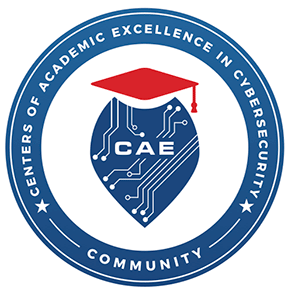
Center of Excellence in Cybersecurity Risk Management
Overview
The Center of Excellence in Cybersecurity Risk Management (CECRM) at Georgetown University prepares students to reduce the risk exposure of organizations through the design and implementation of effective cybersecurity strategies, policies, and governance frameworks grounded in best practices.
Combining practical coursework and hands-on application, the Center offers graduate and certificate programs and vocational training. We examine the field of cybersecurity through the lenses of ethics, communications, risk management, compliance law, security, computer science, and organizational change.
Graduate Education
Doctoral Degree
Georgetown University's Department of Computer Science offers a doctoral program that includes research focusing on security, privacy, and cryptography; data-centric computing; and systems, networking, and architecture. The College of Arts & Sciences program is the Program of Study under the CAE-R designation, which the University has held since 2016. The program connects students with the ideas, skills, and opportunities to shape the digital world in which we live.
Master’s Degrees
The Master of Professional Studies (MPS) is a master’s degree that combines the focused study of traditional graduate degrees (such as the Master of Arts or Master of Science) with the specialized, industry-specific skills students can immediately put to use in the workplace. Driven by the demands of today’s professional landscape, MPS degrees emphasize the skills that today’s employers want. MPS degrees are also highly applied, incorporating hands-on research and client engagements to give students firsthand experience practicing what they learn.
Cybersecurity Risk Management
Computer systems are more efficient and powerful than ever before, but they cannot protect themselves from data breaches and cyber threats. For that, we need highly trained experts who can manage risks, protect data, and anticipate attacks before they happen. The Master’s in Cybersecurity Risk Management (NCAE Program of Study) program at Georgetown University trains professionals for this critical role.
Spanning multiple disciplines including business, law, computer science, and organizational change, the program provides students with hands-on experience that enables them to create strategies, policies, and safeguards to effectively manage organizational risk.
Foundation courses:
- Information Security
- Cybersecurity Governance Frameworks
- Information Assurance & Risk Management
- Information Security Laws & Regulatory Compliance
- Security Architecture & Design
- Communication Strategy for Information Security Professionals
- Disruptive Technology & Organizational Change
Applied Intelligence
For those looking to gain a solid grounding in fundamental intelligence concepts, strategy, and tactics from a global perspective, Georgetown offers a Master of Professional Studies in Applied Intelligence.
Under the expert guidance of industry leaders, scholars, and practitioners, our students develop the skills and experience necessary to take on the ethical responsibilities all intelligence professionals maintain for themselves, corporations, the government, and the public. Through hands-on coursework and case studies in government and industry, students become effective leaders and decision-makers in law enforcement, homeland security, and competitive business intelligence.Graduates leave the program able to decipher actionable intelligence to create insights and make critical decisions in the ever-evolving digital age.
Focus area
Cyber Intelligence: Enhance your professional skills by learning how to produce cyber threat and defense analyses and manage cyber surveillance operations. Students can choose from the following courses:
- Cyber Defense Analysis
- Cyber Threat Intelligence
- Information Security
- Cyber Surveillance Operations & Legal Framework
Information Technology (IT) Management
The demand for expert help in Information Technology Management is across the board, involving businesses and organizations in all sectors. To be competitive, they need to stay up-to-date with the latest technology, integrate new data systems to respond to expanding needs, and, most importantly, keep their data safe. Georgetown’s Master of Professional Studies in Information Technology (IT) Management teaches IT professionals how to design and manage organizational information system strategy.
Our students learn from faculty who are leaders in the field, engage with high-profile guest speakers, tackle projects with fellow classmates, and connect with program alumni. They apply their knowledge to case studies in relevant industries and sectors. And because this is Georgetown, our students develop a thorough appreciation of the ethical responsibilities and expectations of working in a highly sensitive industry.
Graduates leave with the technology and management skills to lead a team or steer an organization.
Focus area
Cybersecurity Risk Management: Students can choose four courses from the below list to earn their graduate certificate:
- Information Security
- Cybersecurity Governance Frameworks
- Information Assurance & Risk Management
- Security Architecture & Design
- Information Security Laws & Regulatory Compliance
- Communication Strategy for Information Security Professionals
- Disruptive Technology & Organizational Change
Graduate Certificates
Graduate Certificate in Cybersecurity Risk Management
Our four-course Graduate Certificate in Cybersecurity Risk Management prepares students to develop and implement risk governance frameworks that increase resiliency for individuals, departments, and organizations. Industry experts expose students to the latest best practices within the cybersecurity landscape. Meanwhile our students gain hands-on experience developing and executing integrated strategies, policies, and safeguards to manage risks across an organization.
Vocational Training
The Information Age shows no signs of slowing down. Every day new technology is developed to send, retrieve, and store more and more information. It’s a daunting task for an organization to handle, but it’s not impossible.
Whether they’re looking to switch careers, advance in their current field, or gain new skills, Georgetown’s professional certificates deliver the skills students need, in the timeframe they require, and in a format tailored to them.
Certificate in Cybersecurity Strategy
In as little as 12 weeks, students pursuing a Certificate in Cybersecurity Strategy learn how to develop cyber strategies that increase security and align with business needs through a comprehensive examination of the cybersecurity field.
Student Resources
Partnerships & Collaborations
Georgetown University is not new to the field of cybersecurity. Through teaching and research, Georgetown has been leading the way for years.
Cyber SMART
Cyber SMART is a National Science Foundation (NSF) Industry-University Collaborative Research Center (IUCRC). Initially established at Georgetown University in 2019 in response to industry demand for a new approach to cyber research and training; the Center’s name, standing for Science, Management, Applications, Regulation, and Training, reflects a new holistic approach.
Cyber SMART’s unique capabilities in law, economics, finance, management, forensics, neuroscience, psychology, behavioral science, and ethics, and its world-leading expertise in computer science, combine to provide much more effective cyber research that addresses real-world needs.
University Information Security Office
Georgetown faculty, staff, and students require secure computer systems and networks to accomplish the University’s mission of teaching, research, and service; therefore the University Information Security Office employs measures to protect the security of its systems, networks, and accounts.
Directed by the Chief Information Security Officer, the Office of Information Security facilitates and furthers the mission of the University while maximizing the confidentiality, integrity, and availability of the University’s distributed information technology assets, systems, networks, and data.
Center of Academic Excellence (CAE) in Cybersecurity Designation
 Institutions that receive a Center of Academic Excellence (CAE) in Cybersecurity designation have met the rigorous requirements set forth by the sponsor of the program, the National Security Agency (NSA). The NSA awards the CAE in Cybersecurity (CAE-R) designations to institutions that commit to producing cybersecurity professionals that will reduce vulnerabilities in our national infrastructure.
Institutions that receive a Center of Academic Excellence (CAE) in Cybersecurity designation have met the rigorous requirements set forth by the sponsor of the program, the National Security Agency (NSA). The NSA awards the CAE in Cybersecurity (CAE-R) designations to institutions that commit to producing cybersecurity professionals that will reduce vulnerabilities in our national infrastructure.
For more information, visit the CAE in Cybersecurity Community which connects all Centers of Academic Excellence (CAE) designated by the National Security Agency and the Department of Homeland Security in the United States.
Faculty
Frederic Lemieux
(Center Point of Contact)Dr. Frederic Lemieux currently serves as Professor of the Practice and Faculty Director of the MPS programs in Applied Intelligence, Cybersecurity Risk Management, Technology Management and...
Read more
Charles Brooks
Chuck Brooks a globally recognized thought leader and evangelist for Cybersecurity. LinkedIn named Chuck as one of “The Top 5 Tech People to Follow on LinkedIn...
Read more
Clare Sullivan
Dr Clare Sullivan is a cyber-lawyer specializing in digital identity, international privacy and data protection, blockchain and cyber security...
Read more
Kathleen Moriarty
Kathleen Moriarty, CTO, Center for Internet Security. Previously, Kathleen was a Distinguished Engineer and the Global Lead Security Architect...
Read more
Kemba Eneas
Kemba Eneas is the Acting National Cyber Director in the Office of the National Cyber Director. Kemba served as the inaugural Principal Deputy National Cyber Director...
Read more
Licerio Ribeiro
Dr. Jay Ribeiro is a cybersecurity leader serving as the Chief Information Security Officer (CISO) for the Bureau of Alcohol, Tobacco, and Firearms...
Read more
Scott Rubin
Scott Rubin is an Adjunct Lecturer in Georgetown University’s School of Continuing Studies, teaching graduate courses in Cybersecurity Risk Management...
Read more
Tom Lash
Tom Lash is a senior leader in technology and management supporting the Federal market for 25 years, specializing in innovative Intelligence Systems...
Read more
Dr. Charles Pak
Charles Pak earned his Ph.D. in Information Security from Nova Southeastern University, an M.S. in Network Security from Capitol Technology University...
Read more
Dr. John Saunders
John H. Saunders is CEO at Cyber Control Systems LLC. He was awarded Professor Emeritus at the National Defense University (NDU) where he taught for 27 years...
Read more
Advisory Board
Collin Barry
Security Leader | Advisor | Investor
Collin Barry is a strategic security leader who has held positions in the U.S. Intelligence Community and multiple private industry sectors, encompassing national security, enterprise IT security, and digital crimes. Mr. Barry brings considerable global experience and perspective to bear, having lived, worked, and led mission-focused teams and programs in Europe, Africa, the Middle East, Southeast Asia, and East Asia.
Niall Brennan
VP, Global Head of Strategic Engagement,
Government and External Security Partnerships
SAP Global Security and Compliance
Niall P. Brennan joined SAP on June 1, 2020, as the global head of strategic security Engagement. In this capacity, he leads relationships with global government security services, legislative and regulatory bodies, public-private partnerships, non-governmental organizations, and academia to address issues related to industry security and resilience, threat mitigation, and regulatory compliance and enforcement. He has over 30 years of experience in a variety of legal, advisory, security, and investigative roles in both the public and private sectors.
An attorney by education and training, Mr. Brennan began his professional life as a commercial litigator in private practice. In 1996, he joined the FBI, where he spent 22 years in multiple operational and managerial capacities across all investigative and investigative support programs, including transnational organized crime, counterterrorism, counterintelligence, cyber, and intelligence. Through his service, he gained extensive experience in complex investigation, information collection and management, crisis management, and international diplomacy. In his last position with the FBI, Mr. Brennan led the office in the U.S. Embassy in Paris, France for over 5 years. He retired from the FBI in 2018 and joined PwC as a director in the cybersecurity & privacy practice, where he led client engagements focused on cyber incident response and mitigation, resiliency-building, and organizational transformation.
Mr. Brennan is married and resides in New York City with his wife and four children.
David Carroll
Vice President Cyber Capability, Engineering and Strategy
General Dynamics
David Carroll’s mission is to strengthen cyber defenses and drive operational excellence in cybersecurity. He leads strategic initiatives that deploy cutting-edge defensive capabilities to safeguard critical sectors, managing complex programs and significant resources to enhance resilience and innovation.
With expertise in regulatory standards, cybersecurity, and cyber defense, Mr. Carroll’s experience spans leadership roles in both government and the private sector, including efforts to enhance security and trust in a global cloud platform. Focused on strategic risk management and AI-driven solutions, he is committed to protecting critical infrastructure against emerging threats and fostering a more secure digital environment.
Tyler Cohen Wood
CEO & CoFounder
Dark Cryptonite
Tyler Cohen Wood is on a mission to make cybersecurity accessible, empowering people to safeguard their digital lives. With over a decade of experience, she has served as a senior intelligence officer and deputy cyber division chief at the Defense Intelligence Agency (DIA), where she developed cyber solutions to protect sensitive information. Her work supported the White House, federal law enforcement, and intelligence communities, helping defend the U.S. from cyber threats.
Paul de Souza
Founder and President
Cyber Security Forum Initiative
Dr. Paul de Souza is the founder of the Cyber Security Forum Initiative (CSFI) and has over 20 years of cybersecurity experience. He is a cyber threat intelligence (CTI) professor at the University of Georgia, Tbilisi. He is an executive in residence at the Geneva Centre for Security Policy (GCSP) in Switzerland, where he leads the CTI Information Sharing Policy Project. Dr. de Souza holds a master’s degree in National Security Studies focusing on Terrorism from American Military University and a Ph.D. in Critical Infrastructure from Capitol Technology University. He is also a recognized Cyber SME NATO instructor.
Jerry Dixon
CISO, Experienced CyberSec Professional
Independent
Jerry Dixon has over two decades of cybersecurity experience on the front lines of incident response, cyber crisis management, national cybersecurity policy, and critical infrastructure protection. Most recently, as the CISO for CrowdStrike and, prior to that, the vice president of Cyber Threat Intelligence and Incident Response for American Express. In the past, he has led teams at Cisco, IRS, Marriott, and Homeland Security. Most notably as the director of the National Cyber Security Division and US-CERT. He was also a member of the Commission on Cybersecurity for the 44th President. Mr. Dixon earned a Master of Science from Norwich University in Information Assurance.
John Israel
Chief Information Security Officer
KPMG
As a seasoned Chief Information Security Officer (CISO) and IT executive, John Israel brings over 28 years of international leadership experience across Europe, Asia, and the Americas. His philosophy centers on the belief that integrating diverse perspectives with bold, timely decisions can drive significant transformation. Mr. Israel is dedicated to challenging the status quo and merging principled thinking, analytical decision-making, and diverse leadership experiences to achieve extraordinary results.
Brian Jamison
VP of Industry & Solution Sales, Americas
Hitachi
Welcome to the dynamic journey of Brian Jamison through the evolving realms of technology, spanning over 23 years. As a proven leader in technology enterprise sales, Mr. Jamisonhas dedicated his career to mastering and innovating within pivotal domains, including artificial intelligence & machine learning, cloud solutions, data analytics & big data, and cybersecurity.
From his foundational years in the field, Mr. Jamison has embraced a spectrum of roles that have ranged from architecting groundbreaking solutions to hands-on development and comprehensive infrastructure leadership. His professional path has been significantly shaped by experiences at leading organizations such as IBM and Microsoft, enriching his insights and fortifying his strategic approach across commercial enterprises, healthcare systems, government entities, and global industries.










